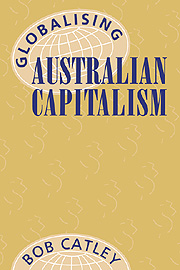Book contents
- Frontmatter
- Contents
- List of Tables
- List of Figures
- Preface and Acknowledgements
- List of Abbreviations
- Introduction
- 1 The International System and the End of the Cold War
- 2 The World Market and the Industrial Revolution in Asia
- 3 The Australian State and Economic Development
- 4 Economic Rationalism Changes Australian Politics
- 5 Government and Business in Australia
- 6 The Public Sector Reinvented
- 7 Australian Industry Restructures
- 8 Geographic Dimensions of Change
- 9 Australia Joins the Asia-Pacific Region: from ANZUS to APEC
- 10 All in a Day's Work
- Notes
- Index
1 - The International System and the End of the Cold War
Published online by Cambridge University Press: 14 January 2010
- Frontmatter
- Contents
- List of Tables
- List of Figures
- Preface and Acknowledgements
- List of Abbreviations
- Introduction
- 1 The International System and the End of the Cold War
- 2 The World Market and the Industrial Revolution in Asia
- 3 The Australian State and Economic Development
- 4 Economic Rationalism Changes Australian Politics
- 5 Government and Business in Australia
- 6 The Public Sector Reinvented
- 7 Australian Industry Restructures
- 8 Geographic Dimensions of Change
- 9 Australia Joins the Asia-Pacific Region: from ANZUS to APEC
- 10 All in a Day's Work
- Notes
- Index
Summary
The changes that have occurred in Australian economic, social and political life during the last twenty years cannot be understood without reference to the international system, for Australia is not a world apart. That system was evolving before European setdement of Australia, and both created and then moulded the contours of life in the new settlerdemocracy that emerged from the convict settlement. People, capital, technology, products, institutions and ideas were imported to the new communities which formed on the seaboard of the continent to spill inland and transform an ancient environment and civilisation. In the process these imports were changed and then augmented by new waves, always changing and bringing new baggage and demands. Periodically the settlers would resist this dynamic, but rarely to much avail. The trick has always been to adapt this relationship to Australia's advantage.
The Sovereign State System
The modern international system has exhibited two principal characteristics since its evolution from Western Europe in the sixteenth century: conflict and co-operation between sovereign states; and the uneven but remorseless expansion of the world economy. Both processes are properly the subject of discrete scholarly disciplines – international relations and economic history – with an extensive body of foundational literature.
Sovereign states evolved in Europe during the sixteenth century from the hierarchy of spiritual and temporal authority known as feudal Christendom. They asserted their right to sovereignty against the universal Church and the Holy Roman Emperor and often proclaimed this authority as deriving from the Divine Right of Kings.
- Type
- Chapter
- Information
- Globalising Australian Capitalism , pp. 4 - 25Publisher: Cambridge University PressPrint publication year: 1996



